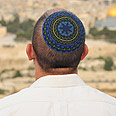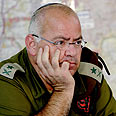

The incoming chief of staff won't be a religious candidate this time around, but apparently even without taking the prestigious role, the national-religious sector is seen as a group that contributes more to the Israel Defense Forces than any other sector in Israeli society.
A joint Ynet and Gesher Center survey revealed that more than half of the Israeli public chose the group from among six groups in total as the one that most contributes to the IDF.
The survey was carried out by the Panels research institute which interviewed 503 people – a statistical sample of the adult Jewish population in Israel, with a maximal sampling error of 4.4%.
In the first part of the survey participants were asked to choose one group or more that in their opinion "contributes the most to the IDF". Some 52% selected the national religious group, 36% selected the kibbutzim, 31% chose the residents of the peripheral towns, 13% chose the settlers, 10.5% selected the new olim and only 4% chose residents of Tel Aviv.
Analysis of the results revealed that the religious (97%) haredim (85%) and the masortim (traditional) survey participants chose yarmulke-wearing soldiers for the number one contribution whereas the secular participants put them in second place after the kibbutzim – with a small lead – 42.5% to 44.6% respectively.
Dual loyalty
In response to the question "do you believe that a religious chief of staff is an option?" 58% answered that it shouldn't be a problem while 25% believe that it is possible as long as the candidate makes a statement declaring that he will abide by any government decision no matter what the halachic view on the matter. Some 17% rejected the possibility over "dual loyalties."
Segmenting the results according to religious group definition revealed that most haredim (92%), religious (91%) and masorti (67%) see the nomination of a yarmulke-wearing candidate to the role of chief of staff as a natural move that shouldn't be conditional or necessitate a loyalty oath. This was also the leading answer among the secular respondents – 46.5%. However, 32.4% supported the need for an oath.
Another chapter of the survey examined the level of confidence Israeli citizens would feel if most of the IDF's senior commanders were religious. Some 58% said they would trust the IDF's upper echelons, 24% would fear the possibility and 18% had no opinion on the matter.
Enlightened society
This question also shows that most of the religious (96%), haredi (92%) and masorti (67%) have confidence in religious commanders. This was also the most common view (47%) among secular survey participants.
Gesher Center's Director General Ilan Gal-Dor addressed the findings: "Over half of the Israeli public sees the national religious as the group that contributes most to the IDF. At the same time the survey also shows that a third of the secular public is concerned over the possibility of religious commanders at the senior command level of the IDF.
"We at Gesher see the IDF as the main place where religious and secular people meet directly. These encounters are the only way to reduce fear and get rid of dividers. Implementing cooperation among various segments of the population through the IDF is also a model for post-IDF daily life.
"In spite of the gulfs, we at Gesher will continue to bring together different groups in Israeli society in order to build an enlightened and equal society," he said.
- Follow Ynetnews on Facebook















